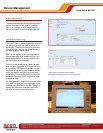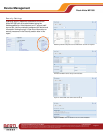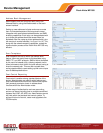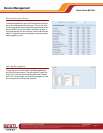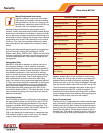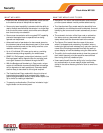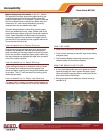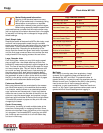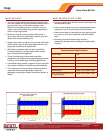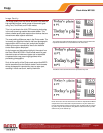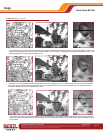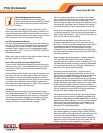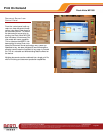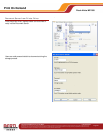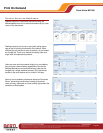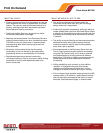
Copyright © 2006 MCA Internet, LLC dba BERTL. 13 November 2006
All Rights Reserved. The license under which this document is made available and applicable law prohibit any reproduction or further transmission of any portion of this document. This
document may only be viewed electronically through the www.BERTL.com Web site and may not be stored in electronic or hard copy format. Any reproduction of trademarks is strictly
prohibited. BERTL accepts no responsibility for any inaccuracies or omissions contained in this document.
Page 22
Ricoh Aficio MP1350
WHAT WE LIKED:
• The user-friendly interface provides both experienced
and novice users with a quick and easy method to build
copy jobs with many of the most commonly-used
features on the opening screen. In addition, up to six
unique, one-touch buttons bring common applications
within a single finger press.
• Mixed size original scanning mode suffered from a
much lower slow down (compared to default auto-size
detect) than some competing units.
• Image quality was to a high level for general office work
across a wide range of document types with even mid
grayscales reproduced to a good level.
• We liked the extensive batch job build capabilities
including the ability to change media sizes, original
type, and reduction/enlargement.
• There is a wide range of document production
capabilities including extensive page stamping features,
including one for bates type numbering applications.
• A simplified display makes navigation of basic functions
even easier and faster and aids those with disabilities.
• The Unauthorized Copy prevention mode that adds a
watermark when second generation copies are
attempted, rendering the copied documents useless, is
helpful.
WHAT WE WOULD LIKE TO SEE:
• Using the saddle stitch function can be confusing to first
time/occasional users.
• Users cannot choose cover and insert/designate media
supplies ad hoc during the job production process.
• Users are not able to customize the copy opening panel
on a user- by-user basis (identified via authentication
step).
• Reversing document feeder design results in
productivity decrease when working with double-sided
originals.
Corner Staple 1 step
Hole Punch 1 step
Enlarge to 200% 2 steps (can be made 1 step)
2:2 2 steps (can be made 1 step)
Photo Mode 1 step
Mixed Original 2 steps (can be made 1 step)
Cover Mode (printed front cover
on bypass supply)
2 steps (can be made 1 step)
Touch Screen Selections Required for
Commonly-used Copy Functions
Copy



